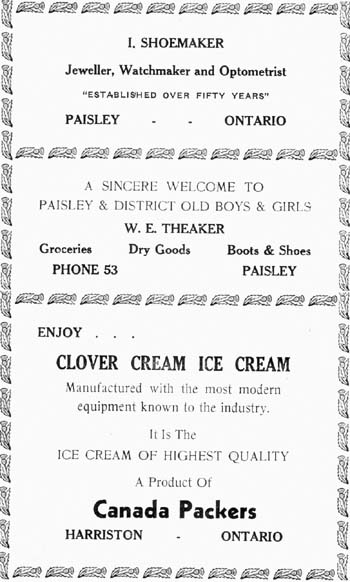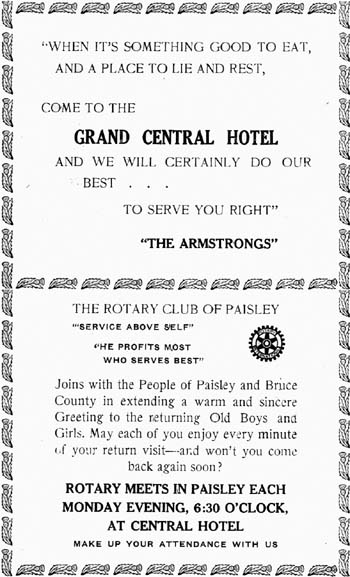
 |
Paisley Many Years Ago
So far as we know this is the earliest picture of the Town Hall building.
|
PAISLEY MANY YEARS AGO By Walpole Murdoch, One of the most active and ambitious of the business men of seventy-five years ago was Mr. James Laidlaw. Laid1aw’s foundry was situated near the old Willow Creek bridge on a corner of the principal streets, Queen and Cambridge. The buildings that formed the establishment were numerous, and high above the smoke-discoloured roofs, towered an immense chimney made of red bricks from which issued a great quantity of black smoke. Nearby was an arched belfry from which sounded regularly the early call to each day’s labor. (Ed. Note--The belfry and its bell are long gone from the scene, but the chimney mentioned by Mr. Murdoch still stands alone, and ‘apparently as sound as it was several decades ago.) In the foundry were employed more than two score men who were engaged in all the various tasks of turning wood and iron and paint into plows, mowers and reapers. It was a thrill for young school boys to be permitted to stand in the open door of the large casting house and listen to the furnace roar and watch the bright molten metal flow from the moaning furnace and fill the sunless room with tiny shooting stars, while red-faced, bare-armed men moved about like shadows on the earthen floor. Others among Paisley’s active business men of those times were Duncan and John F'isher. Fisher’s carding mill, flour and saw mill, with their spouting flumes and overflowing dam on the Teeswater River near the Main Street bridge advertised the beauty of the town, turned the river into foam and produced a great variety of sounds that harmonized with the character of the place. One of the water wheels revolved in the open air within sight of those crossing the bridge and noisy cogs sang a song through all the busy days. The first cloth manufactured by power in Paisley was woven –on looms introduced by Mr. John A. Murdoch. The original three-storey woollen mill, painted blue, stood on the bank of the Saugeen and was driven by power obtained from the diverted waters of Willow Creek. The factory was burned in 1870. The second one that took its place was dismantled many years later, and now scarcely a fragment remains to mark the spot. Sinclair’s and Blackburn’s planing and saw mills were united with MacKay’s and Young’s fine planning mills. The large building, with boiler rooms and smoke stack, stood on the banks of the Saugeen River near the Baptist Church. On one side was a tramway to carry the lumber to the yards nearby. The Mackey & Young mill was on Victoria St. north, and years later was operated by Scott & Grant.
|
A HALLOWE’EN PRANK Two brothers there were of old, C.R.L.F.
|
WINTER SPORTS The winter has swooped down upon us |
MEMORIES OF THE OLD HOME TOWN By Walpole Murdoch, I cannot go back in person to partake of the pleasure of the reunion holiday in the “Old Home Town” of Paisley, but I can visit the charming place in imagination, and to-day as I, in this way, wander along, the Saugeen there comes to me the memory of delightful years of boyhood spent on the sloping banks of the river. Here in front of our old home (now vanished) is the little Eddy, and here is the large rock with flat top that used to project above the surface of clear water and where I often stood with bare feet, browned by sun and wind in summer, when fishing with rod and line. The rock was only 3 steps from the bank. Anglers upon that rock enjoyed a wide sweep of the little bay, always a favorite place for fishing. On the point of land above the rapids driftwood accumulated and beneath the submerged logs fish of large size were caught and frequently succeeded in tangling the line. There was a clump of flags that bloomed at the edge of the stream. Close by a butternut tree and several hawthorns leaned towards the water and on the grass in the shade of these trees was just right for boys to congregate and tell stories. The trees are gone now and the bay seems very small indeed; around the rock the grass grows, but the rapids nearby still murmur their endless song - the factory with its noisy looms has vanished along with the home and the silver poplars that fringed the garden - emblems of all earthly expectations, I observe that time has made many changes. Springs that used to gush from overhanging banks have ceased to flow. Where once the shadows gloomed the deep pools trees that stood with pevdant roots have been dislodged and gone their way with the currents of seventy years. Trees that used to carry tangled grape vines in their bows have vanished leaving only a memory of wild fruit and happy autumn days -The river seems smaller and distance less than imagination had painted. The visitors at this time are mostly strangers to me but memory becomes busy with companions of long ago, almost all of whom have reached that vast realm of silence where the innumerable dwell and where all that live must reach their journey’s end.
|
 |
 |
| Return to top of Page | Return to top of Page |